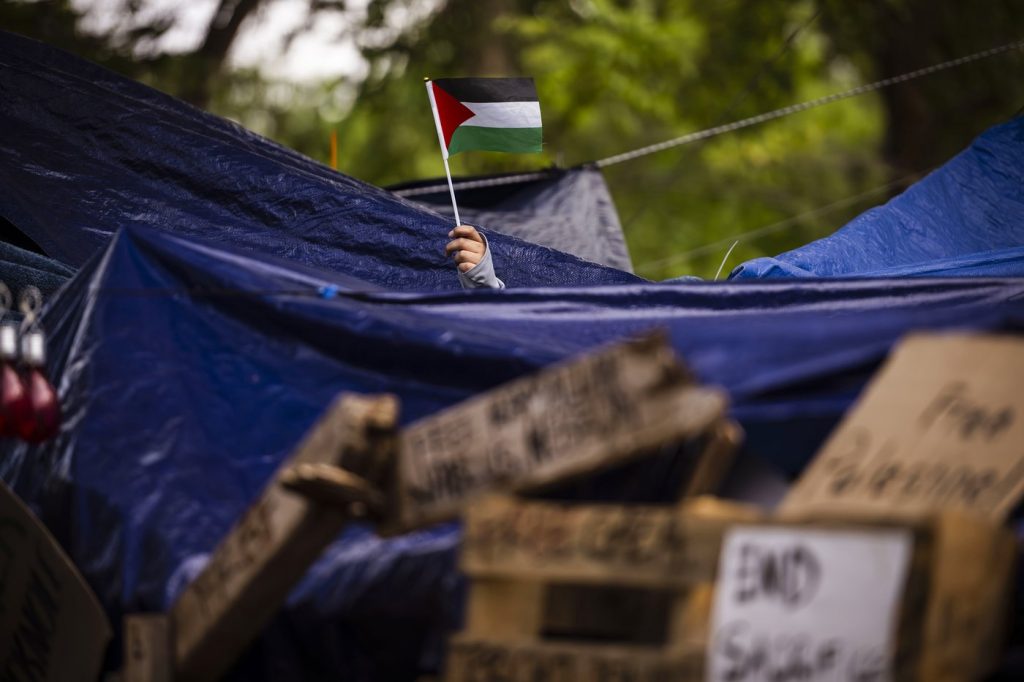In January, a protester attending a New York rally against Israel was filmed with only her eyes visible due to a mask and headscarf. Soon after, her identity, including her full face, name, and employer were exposed online, thanks to a facial-recognition tool developed by a technology company. This incident highlights a growing trend of using technology to identify and target individuals involved in political activism, particularly those participating in pro-Palestinian marches at U.S. colleges.
Right-wing groups have utilized this technology, encouraging supporters to report foreign students engaged in activism against the Gaza war to the Immigration and Customs Enforcement (ICE). Concerns have surfaced regarding the implications of such surveillance for international students, who fear for their legal status due to their participation in protests. Abed Ayoub, the national executive director of the American-Arab Anti-Discrimination Committee, expressed concern over the outsourcing of surveillance, indicating that these practices could have profound implications for those targeted.
The usage of facial recognition software to identify activists has blurred the lines between private group initiatives and public law enforcement. A prominent incident involved the arrest of Mahmoud Khalil, a Columbia University graduate of Palestinian descent who co-led demonstrations against Israel. Reports have indicated a broader crackdown on international students involved in activism, raising fears among foreign students about the repercussions of their political engagement.
Activist groups have been vocal in their criticism, noting that the process of identification and reporting could lead to wrongful accusations, jeopardizing the futures of innocent students. Some groups focus on actions deemed more severe than mere protest participation, claiming to target individuals involved in inciting violence or occupying university spaces.
A key developer of the facial-recognition tool, Eliyahu Hawila, has openly supported the identification and reporting of individuals participating in protests. He advocates for accountability, albeit with a clear stance that freedom of speech does not exempt individuals from societal consequences. In a concerning turn of events, it was reported that the woman whose identity was revealed by the tool lost her job as a result of the backlash from pro-Israel groups.
The dissemination of personal information, termed "doxing," has become prevalent in the context of heightened tensions surrounding the Gaza conflict. This practice has drawn attention to ethical concerns regarding the use of facial recognition technology, which has traditionally been the domain of law enforcement. Experts argue that the use of such technology by private organizations may set dangerous precedents for civil liberties and protest rights.
Public calls to report activists to immigration authorities have further escalated the situation. Messages encouraging the reporting of international students supporting causes like Hamas have circulated widely among certain groups, amplifying fear within activism circles. For instance, Elizabeth Rand, president of Mothers Against Campus Antisemitism, urged followers on social media to document and report foreign activists, linking them to ICE tip lines.
As tensions continue, the targeting of student protesters has given rise to a climate of fear and self-censorship among international students. Many now consider the potential immigration ramifications of their participation in protests and social media activities, leading to a chilling effect on activism. Leaders of student organizations have reported that some members have opted to conceal their identities or withdraw from public engagement to avoid scrutiny.
The implications of the increased scrutiny and identification efforts extend beyond individual students. The environment fosters a culture of informants and raises significant concerns reminiscent of authoritarian regimes, as expressed by student activists. The atmosphere of distrust and fear has become a topic of discussion among students of various backgrounds, affecting the unity and collaboration necessary for effective activism.
As the landscape of campus activism evolves, the intersection of technology, surveillance, and political dissent remains a critical area of discussion. The actions of both pro-Israel and pro-Palestinian groups reveal deep divisions over free speech, civil rights, and the implications of using modern technology to monitor dissenting voices.










